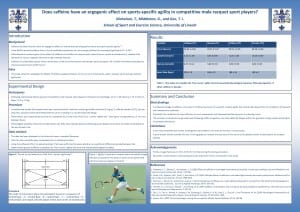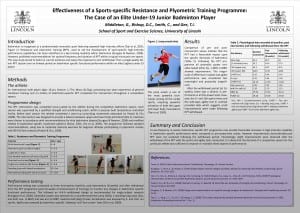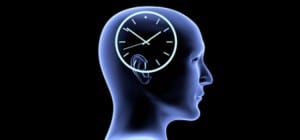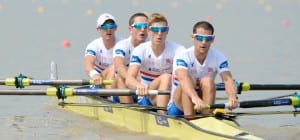Members from the PESP research group; Geoff Middleton and Dr Tom Gee, attended and presented two accepted research posters at the 2013 UK Strength and Conditioning Association Conference held at the East Midlands Conference Centre (31st Aug – 1st Sept). The posters were titled ‘The Implementation of a Sports-Specific Resistance and Plyometric Training Programme for an Elite Junior Badminton Player’ and ‘Does caffeine have an ergogenic effect on sports-specific agility in competitive male racquet sport players?’. Overall the conference provided a good mix of theoretical key note presentations from a global mix of leading strength and conditioning scientists and more applied breakout workshops delivered by world class practitioners.




 How well can you predict the passage of time? What about when you’re exercising? A study with the School of Sport and Exercise Science is currently investigating whether exercise intensity, that being light, moderate and hard, alters the way we perceive the passage of time. Theory suggests that as our physical sensations amass during physical exertion (e.g. temperature, acute discomfort, breathing rate etc…) our “emotional reservoir” begins to fill up. This has been proposed to alter our perception of the passage of time. Just think how your perception of time speeded up when you last watched a great film at the cinema? Or, how your perception of time slowed down when you were last waiting for a bus or train? The study aims, for the first time, to investigate whether as we exercise we are less accurate in estimating (i.e. forecasting) a pre-determined task end-point. That being, does our perception of time speed-up or slow-down when we place our bodies under strain?
How well can you predict the passage of time? What about when you’re exercising? A study with the School of Sport and Exercise Science is currently investigating whether exercise intensity, that being light, moderate and hard, alters the way we perceive the passage of time. Theory suggests that as our physical sensations amass during physical exertion (e.g. temperature, acute discomfort, breathing rate etc…) our “emotional reservoir” begins to fill up. This has been proposed to alter our perception of the passage of time. Just think how your perception of time speeded up when you last watched a great film at the cinema? Or, how your perception of time slowed down when you were last waiting for a bus or train? The study aims, for the first time, to investigate whether as we exercise we are less accurate in estimating (i.e. forecasting) a pre-determined task end-point. That being, does our perception of time speed-up or slow-down when we place our bodies under strain?
 How one paces themselves throughout a sporting event (that being the strategy adopted in order to achieve the best performance time over a set distance) has received considerable research attention over the last decade. Exploring how we self-pace during a range of sporting events has begun to provide insight into how we control our exercise intensity and what may limit our endurance performance capability.
How one paces themselves throughout a sporting event (that being the strategy adopted in order to achieve the best performance time over a set distance) has received considerable research attention over the last decade. Exploring how we self-pace during a range of sporting events has begun to provide insight into how we control our exercise intensity and what may limit our endurance performance capability.